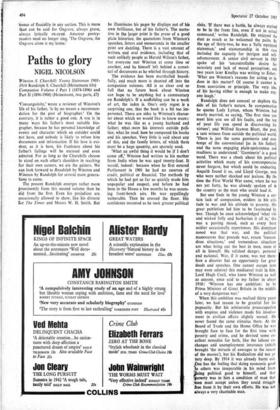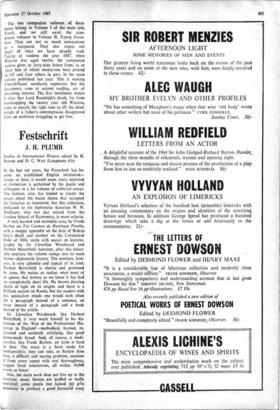Paths to glory
NIGEL NICOLSON
'Consanguinity,' wrote a reviewer of Winston's life of his father, 'is by no means a recommen- dation for the post of biographer.' On the contrary, it is rather a good one. A son is in many ways his father's most suitable bio- grapher, because he has personal knowledge of events and character which an outsider could not have, and nobody is likely to refuse him documents and information. If his love is evi- dent, as it is here, his frankness about his father's failings will be excused and even admired. For as long as the Churchills choose to stand on each other's shoulders in reaching for their own careers, we are the gainers. We can look forward to Randolph by Winston and Winston by Randolph for several more genera- tions to come.
The present Randolph emerges rather more prominently from this second volume than he did from the first. Even his prejudices are occasionally allowed to show, like his distaste for The Times and Messrs W. H. Smith. But he illuminates his pages by displays not of his own brilliance, but of his father's. The narra- tive in the larger print is the prose of a good plain historian; the quotations from Winston's speeches, letters and memoranda in the smaller print are dazzling. There is a vast amount of written, and oral evidence, including that of such unlikely people as Harold Wilson's father, for everyone met Winston at some time or another, and he himself left behind a comet- tail of documents as he whirled through history.
The evidence has been marshalled beauti- fully, and much more is shunted off into the companion volumes. AU is so clear and so full that no future book about Winston can hope to be anything but a commentary on Randolph's. If a scaffolding can be a work of art, the index is. One's only regret is a surprising one, that the book is a bit too im- personal. There are sides to Winston's charac- ter about which we would like to know more:. what he was like as a young husband and father; what were his interests outside poli- tics; what he read; how he composed his books and his speeches. Very little is said about any of this, and the family letters, of which there must be a huge quantity, are sparsely used.
'What an awful thing it would be if I don't come off,' Winston had written to his mother from India when he was aged twenty-four. It would, indeed: because when he first entered Parliament in 1901 he had no reserves of credit, political or financial. The methods by which he had got so far so quickly made him unpopular and suspect, and before he had been in the House a few months he was assum- ing front-bench airs. He was appallingly vulnerable. Then he crossed the floor. His confidence mounted as he took greater political
risks. 'If there was a battle, he always aspired to be in the front line, even if not in actual command,' writes Randolph. He enjoyed the dust as much as he welcomed the palm. By the age of thirty-two, he was a 'fully eqUipped statesman,' and statesmanship in this case included the capacity for intrigue and Self. advancement. A senior civil servant in 1907 spoke of his 'uncontrollable desire for notoriety and lack of moral perception; and two years later Knollys was writing to Esher: 'What are Winston's reasons for acting as be does in this matter? Of course it cannot be from conviction or principle. The very idea of his having either is enough to make any- one laugh.'
Randolph does not conceal or deplore this side of his father's nature. In compensation he quotes Lady Lytton, whom Winston had nearly married, as saying, 'The first time you meet him you see all his faults, and the rest of your life you spend in discovering his virtues'; and Wilfred Scawen Blunt, the poet, a rare witness from outside the political world, 'There is just the same gaminerie and con- tempt of the conventional [as in his father], and the same engaging plain-spokenness and readiness to understand.' Gaminerie' is a good word. There was a cheek about his political activities which many of his contemporaries never forgave, but which could be endearing. Asquith found it so, and Lloyd George, men who were neither shocked nor jealous. By the time the First World War came, when he was not yet forty, he was already spoken of in the country as the man who could lead it.
But one finds in the young Winston a cer- tain lack of compassion, evident in his atti- tude to war and his attitude to poverty. His great patriotism led him to be fascinated by war. Though he once acknowledged 'what vile and wicked folly and barbarism it all is,' this was a passing mood, such as every born soldier occasionally experiences. His dominant mood was that war, and the political manoeuvres that precede war, create 'tremen- dous situations,' and tremendous situations are what bring out the best in men, most of all in himself. He relished danger, personal and national. War, if it came, was not there- fore a disaster but an opportunity for great deeds and speeches. One cannot escape (one may even admire) this mediaeval trait in him. Lord Hugh Cecil, who knew Winston as Well as anyone, once said to my father in about 1910: 'Winston has one ambition : to be Prime Minister of Great Britain in the middle of a very dangerous war.'
When this ambition was realised thirty years later, we had reason to be grateful for his pugnacity. But his aristocratic preoccupation with empires and violence made his involve- ment in civilian affairs slightly unreal. He never found the same stimulus there. At the Board of Trade and the Home Office he was brought face to face for the first time with poverty and crime, and he devised some ex- cellent remedies for both, like the labour ex- changes and unemployment insurance (which brought 'the miracle of averages to the rescue of the masses), but his Radicalism did not go very deep. By 1914 it was already burnt out. Pne has the feeling that doing economic good "to others was inseparable in his mind from Irtloing political good to himself, and that poverty was to him a condition of man that ;men must accept unless they could struggle tree from it by their own efforts. He was not always a very charitable man. The two companion volumes of docu- ments belong to Volume I of the main text, Youth, and we still await the com- panion volumes to Volume II, Young States- man. They are not so much companions as a rearguard. They also repeat too much of what we have already read. Taking at random the year 1887, when Winston was aged twelve, the companion volume gives us forty-nine letters from, to or about him of which twenty-one were printed in full and four others in part, in the main volume published last year. This is making 'Churchilliana' needlessly expensive. But the documents, even at second reading, are of absorbing interest. The first instalment makes it clear that Lord Randolph's death, far from handicapping the twenty year old Winston, came at exactly the right time to lift the dead- weight of a father's contemptuous disapproval from an ambition struggling to get free.











































 Previous page
Previous page